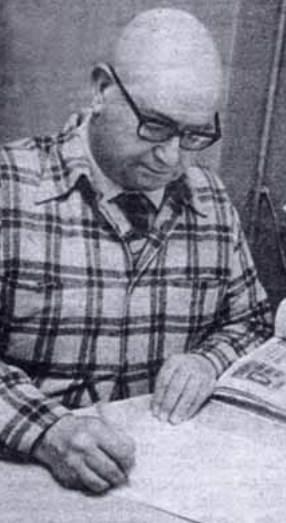Urbano Carrasco
A reporter by excellence, a master of improvisation and an adventurer-journalist, Urbano Carrasco is one of the big names of Portuguese journalism. For four decades he made the first pages ofDiário Popular, covering the most important events of his time
On the 13th of October, 1957, Diário Popular wrote on its first page:
“The special envoy of Diário Popular was the first person to disembark in Ilha do Vulcão where he implanted the Portuguese flag”.
In the end of September of 1957, after six months of earthquakes, a new volcano erupted near Capelo, in the Azorean island of Faial.
At this time, Diário Popular lived a golden period, and rivaled with the most important newspapers in the country.
Urbano Carrasco was the special envoy of the evening newspaper. Every day he would call the newsroom with update news from Azores, even creaintg the name of the island of sand and ash formed by the volcano, which would be highly reproduced for all media: Ilha do Desespero [Island of Desperation].
The news about the volcano’s stage would vary on a daily basis. By registering an optimistic report, scientists and investigators organized a scientific mission to the island, aboard of the São Tomé patrol-ship.´
While the volcano expelled a big show of explosions and ashes, the reporter had his most bold idea ever.
The adventurer-reporter
By meeting Tomás Vargas, owner of the abandoned house where the scientific mission had installed, Urbano Carrasco heard from the elder his wish of “placing the national flag in the island”.
This is how the journalist decides to search for a boat that would take him to Ilha do Desespero. Eduíno Labescat, a Faial native descendente from French, promised him the Quo Vadis boat, but with the condition of finding four rowers, in case the motor failed.
Urbano lied to the owner of the boat and told him that he already had the four rowers but, in truth, only the RTP cameraman Carlos Tudela had joined the adventure.
After a quite troubled trip, Tudela and Carrasco were able to reached the island, and place the flag of Portugal in the black sand.
This stunt, nevertheless, wouldn’t come to be registered in any photo or recording camera: the ashes and the clay had broken down all devices.
But the feat crossed distances.
In Rádio Clube Angra, João Afonso interrupted the emission to announce that “the island is no longer only black. The island received its first colors: green and red”.
Diário Popular redacted the famous cover, with the help of an illustration by the successful Stuart Carvalhais.
Urbano Carrasco’s feat crossed the Portuguese press and televisions in the following days.
A career dedicated to Journalism
Urbano Carrasco was born in Santo Agostinho, in Moura, Alentejo, in 1921.
Member of a family connected to Letters, Urbano would follow the steps of his uncle Urbano Rodrigues, a famous journalist of Diário de Notícias, and of his cousin Miguel Urbano Rodrigues, himself also a journalist.
The reporter had the reputation of improvising and solving any situation.
In the day that Portuguese journalists were invited by NATO for a story aboard of an aircraft carrier, Urbano caused sensation for entering aboard with cages full of pigeons.
Upon the arrival to the destination, journalists had to rush to communicate to their newsrooms the texts. Urbano didn’t had to worry: his carrier pigeons had arrived earlier to the newsroom of Diário Popular.
At the service of Diário Popular, Urbano Carrasco would make first pages for 40 years.
He signed memorable stories in Angola, Israel, in Vietnam and also at the then forbidden Soviet Union.
He would also distinguished in the conflicts in India in the Christmas of 1961, during which he became a war prisoner in a concentration camp.
A journalist identified with Estado Novo, Urbano Carrasco would even serve as a mailman to Salazar himself during the Congo conflicts.
He passed in the dawn of December 7th of 1982.
Urbano Carrasco stood out from the others for his writing skills and, mainly, for his pragmatic spirit.
He was above all passionate about Journalism, becoming one of the main reporters of the national written press of the second half of the 20th century.
“Urbano Carrasco was an extraordinary professional of the press and a Portuguese of a major moral dimension”.
Baptista Bastos.




